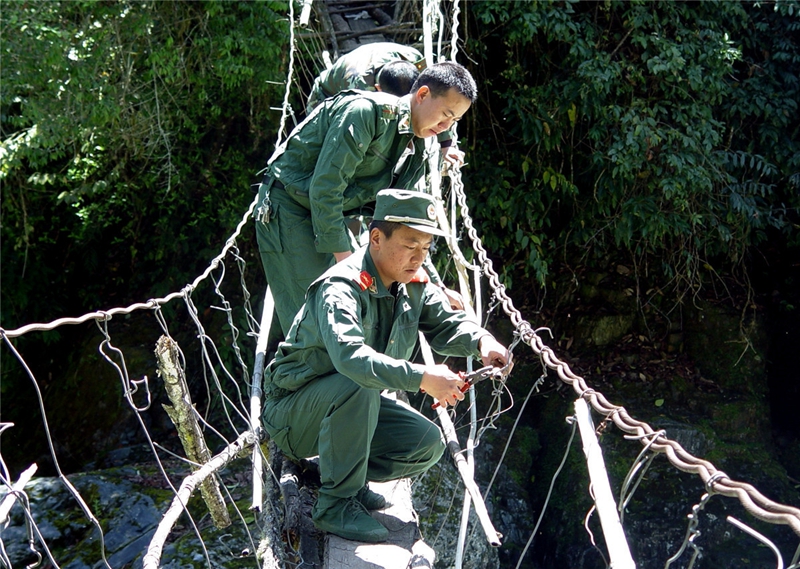
Officers repair a rope bridge in Dulongjiang in 2006. [Photo/China Daily]
Power outages
Niu Ming, deputy instructor at the Dulongjiang Border Control Police Station, said the long distances, frequent landslides and avalanches mean officers at Qinlangdang often experience power outages, some of which last for days.
A large proportion of the food at the post needs to be transported from the police station, and when landslides block the road, the officers have to carry the rations on their backs, he said.
The rolling hills and harsh climate once made the journey from Dulongjiang to the outside world as difficult as the trip to the border posts in the forest, and landslides, avalanches, wild animal attacks and traffic accidents still make the journey extremely arduous.
In years gone by, the journey from Dulongjiang to Gongshan Dulong and Nu autonomous county took several days. It was not until 1999 that a road was built to link the area with the outside world, making it one of the last townships in China to be connected to a major highway.
The road has cut the journey time from Dulongjiang to Gongshan to half a day, provided there are no traffic accidents or landslides. However, access to the township is still blocked by snow for almost six months every year.
Apart from conducting border patrols, the officers at the Qinlangdang post and Dulongjiang station help the locals deal with daily problems.
They frequently make home visits to collect information for ID cards, such as photos and fingerprints, and to teach the villagers to grow herbs, keep bees and raise cattle and chickens to diversify their sources of income.
They also deliver daily necessities and food to the villagers, and sometimes even cut their hair.
They have also built a primary school in Maku village, with officers acting as teachers.
Almost 500 students have graduated from the school, with 162 going on to graduate from high school and 10 graduating from college.
When Li first arrived at Dulongjiang in 2000, there was no restaurant or cellphone coverage.
His parents live in his hometown of Hengyang, Hunan province, and his wife and two children live in Liuku, capital of Nujiang.
Officers in Dulongjiang are allowed 40 days of paid leave annually, but the isolation and poor roads mean few manage to take their full allocation.
"One of my biggest regrets is being unable to be with my wife when she was giving birth to our two children.
Unlike most couples, who can eat dinner together and be there for each other on 'rainy' days, we connect via a daily WeChat video and our reunions are always too short," Li said.
When he visited his wife and children in Liuku in June, his son was thrilled and proudly told his friends that his police officer dad had come home for a visit.
"My son and I weren't use to be so close, because I have spent little time with him. However, as he grows older, he can understand that I am doing something important. I can see that he is proud of me," Li said.
|






7740f3b5-9ecb-438e-9052-76cb2d4bb671.jpg)

